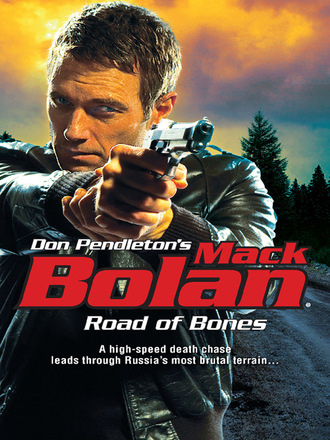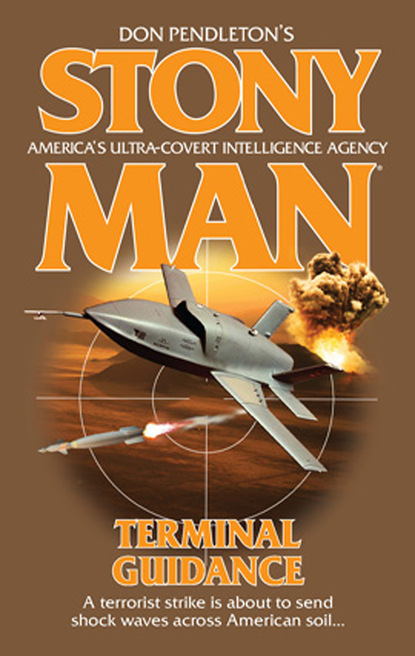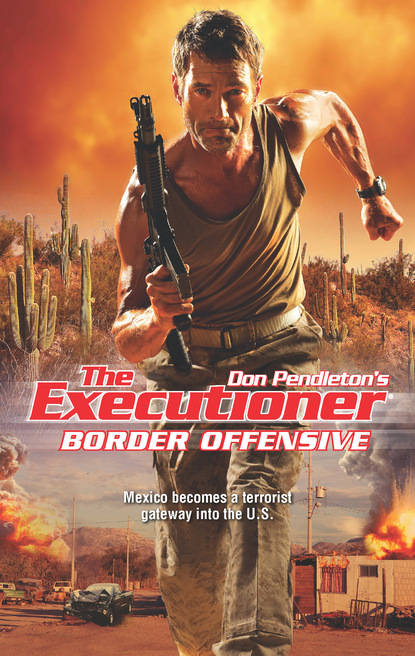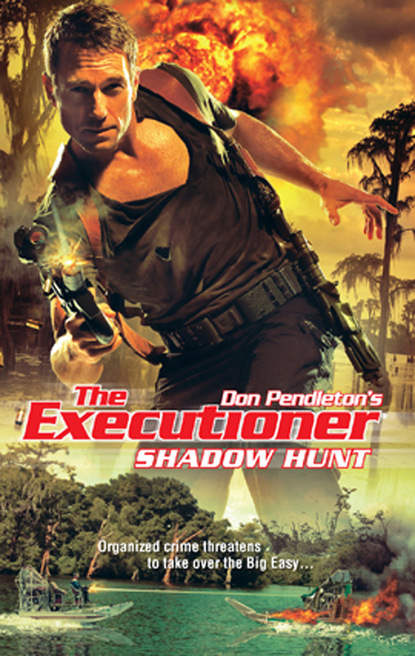
Полная версия
Road Of Bones

Highway to hell
Dispatched on a high-priority search-and-rescue mission, Mack Bolan becomes a moving target in the cold heart of Siberia. He’s on a motorcycle hell ride along a thousand miles of broken, battered highway. Known as the Road of Bones, it’s a mass grave to thousands of slave laborers buried during Stalin’s iron rule.
A defecting Russian intelligence agent’s testimony stands to aim heavy artillery at Russian mobsters in America. To silence her, a hunter-killer team of secret police and gangsters engage in hot pursuit. The enemy has the edge: manpower, weapons and home-field advantage. For Bolan, it’s a one-way trip on an open road effectively sealed at both ends by death squads. Every mile survived brings them both either closer to freedom…or ultimate doom.
So much for stealth
He’d only got halfway to the lights when the man addressed him from a pool of shadows to his left, between a thresher and a skid loader. The lookout spoke in Russian, but his challenge had the tone of “Who in hell are you?”
Bolan let his AK answer back, one Russian to another. Three rounds at a range of six or seven feet, two punching through a plastic cooler the stranger carried, loosing plumes of smoke. His muzzle-flashes lit a startled face before it toppled over backward, out of frame.
He dodged between a swather and a mower, reached a different aisle and pounded toward the bright oasis where the action was. Bolan could hear people scrambling, as a voice called out, “Mikhail? Mikhail!”
Presumably calling the dead guy.
Bolan let the others wonder about the body as he moved in for the kill.
Road of Bones
Don Pendleton

Russia will not soon become, if it ever becomes, a second copy of the United States or England, where liberal values have deep historic roots.
—Vladimir Putin
1952-
Don’t you forget what’s divine about the Russian soul—and that’s resignation.
—Joseph Conrad
1857-1924
I’m resigned to do this job regardless of the opposition. I’ll bet my soul on it.
—Mack Bolan
Special thanks and acknowledgment to Mike Newton for his contribution to this work.
Contents
PROLOGUE
CHAPTER ONE
CHAPTER TWO
CHAPTER THREE
CHAPTER FOUR
CHAPTER FIVE
CHAPTER SIX
CHAPTER SEVEN
CHAPTER EIGHT
CHAPTER NINE
CHAPTER TEN
CHAPTER ELEVEN
CHAPTER TWELVE
CHAPTER THIRTEEN
CHAPTER FOURTEEN
CHAPTER FIFTEEN
CHAPTER SIXTEEN
CHAPTER SEVENTEEN
CHAPTER EIGHTEEN
CHAPTER NINETEEN
CHAPTER TWENTY
CHAPTER TWENTY-ONE
CHAPTER TWENTY-TWO
CHAPTER TWENTY-THREE
CHAPTER TWENTY-FOUR
CHAPTER TWENTY-FIVE
EPILOGUE
PROLOGUE
Yakutsk, Sakha Republic, Russian Federation
Yakutsk Airport was small by Western standards. One of its two runways was a parking lot for aircraft, while the other handled both arrivals and departures, moving seven hundred passengers per hour at peak efficiency. The international terminal, built in 1996, was showing signs of age. The domestic terminal, meanwhile, was constructed sixty-five years earlier, in Stalin’s time.
Tatyana Anuchin and Sergey Dollezhal were going international, a Ural Airlines flight to Leonardo da Vinci-Fiumicino Airport in Rome with 160 other passengers and crew aboard a Tupolev Tu-154M—Russia’s equivalent of the Boeing 727. The aircraft had a cruising range of twenty-seven hundred miles, which meant a stop for fuel in Chelyabinsk before proceeding on to Italy. With time on the ground, that meant nine more hours before they cleared Russian soil.
Before they were safe.
“You need to relax,” Dollezhal said.
“I’ll relax in Rome,” Anuchin replied. “Better yet, in London.”
“You give them too much credit,” he chided. “We have a good lead.”
“Oh, yes? Why not hire a car, then?” she challenged. “We’ll make it a holiday.”
“All I am saying—”
She cut him off, hissing, “They’re not as stupid as you give them credit for. They must know that we’re running by now.”
And unarmed, since they had left their weapons in the car at long-term parking, to avoid any problems with airport security. Anuchin felt naked without the MP-443 Grach semiauto pistol she had carried with official sanction for the past nine years, used twice in the line of duty.
All that was behind her now that she was running with Dollezhal.
“We board in twenty minutes,” he remarked.
“And they could just as well be waiting when we land in Chelyabinsk, with two damned hoºurs to kill.”
“It was the best connection we could manage,” he reminded her.
“I know that, but it isn’t good enough.”
“You say I give them too much credit for stupidity, Tanni,” he said, using her nickname. “I think you make them omniscient when they’re not.”
“We’ll see,” she answered, thinking to herself that twenty minutes was a lifetime.
* * *
“SPREAD OUT and sweep the terminal. Eyes sharp,” Valentin Grushin said.
“And if we spot them?” Pavel Antonov inquired.
“No shooting in the terminal,” Grushin replied. “No shooting, period, unless they leave no other choice. Remember they’re wanted for questioning.”
Mikhail Krylov snorted at that. “They may prefer to be shot.”
“It’s their choice, then,” Grushin said. “Just follow your orders.”
They fanned out to cover the terminal, three hunters seeking their prey. Outside the terminal, watching the exits, their fourth man—Fyodor Dushkin—sat at the wheel of a Lada Riva sedan, waiting to signal if the targets slipped past them somehow.
If they were even at the airport now.
Grushin trusted the tip they’d received, but the caller had mentioned no flight in particular, no destination. By now, the targets could have flown the coop on any one of nine airlines, with destinations ranging from China and Thailand to Egypt, Tunisia and most of Europe.
What they would not do, if they were sane, was try to hide in Russia. That was tantamount to slow and painful suicide.
Grushin was tasked to find and seize the targets, not pursue them if they managed to fly out of Yakutsk Airport. If he missed them, his part in the hunt was finished.
But his trouble would have just begun.
The people who employed him paid for positive results in cash. Their currency for failure was a very different proposition altogether.
As he moved along the concourse, Grushin watched for uniformed Militsiya officers, acutely conscious of the PP-2000 machine pistol that he wore beneath his long coat on a leather sling. The weapon measured only 13.4 inches with its stock folded and weighed about five pounds with a fully loaded magazine of forty-four 9 mm Parabellum rounds. For this job, Grushin had foregone the 7N31 +P+ armor-piercing loads, but had some in the car, in case the hunt became a chase on wheels.
In which case, he supposed, they likely would have failed.
A crackle from the tiny earbud that he wore almost made Grushin jump. Krylov’s voice telling him, “I’ve found them. Ural Airlines.”
Flushed with instantaneous relief, Grushin changed course and walked more rapidly across the terminal.
* * *
“SON OF A BITCH!” Dollezhal spit the words as if they tasted foul. “I know that man in the blue windbreaker.”
Anuchin found the man he was referring to and felt her heart skip as she realized that he was watching them.
Five minutes left until their flight was called for boarding, and the chance was lost to them. How many other trackers were there in the terminal, converging on them even now?
“Let’s go,” Dollezhal said urgently.
“Go where?” she countered. “He’s already seen us.”
“Seeing’s one thing,” he replied. “Holding’s another.”
Fearing that they were already lost, she nonetheless stood and shouldered her carry-on with the laptop inside. There was nothing in it to hang them if she had to ditch it, running. All the details were inside her head and in her companion’s, ready for bullets to scramble and wipe out the warning they carried.
Even now, they didn’t run, but walked with purpose, swiftly, Anuchin having no idea of Dollezhal’s plan or destination. When they missed their flight, as they were bound to do, what avenues remained?
“In here,” he said, ducking into a men’s restroom without looking back.
Cheeks flaming from childish embarrassment, Anuchin followed, prepared to ask what he was doing when he clutched her arm and pulled her away from the door.
“Find a stall,” he commanded. “Lock it. Put your feet up.”
As if that would help, when the man had seen them both enter. Still, she followed instructions, chose the middle of nine toilet stalls, closed the door and secured its cheap latch. Then she climbed up on the seat, crouching awkwardly over the bowl.
Anuchin heard the restroom door swing open, followed by a scuffling sound and muttered cursing.
Dollezhal was fighting for his life.
Her first instinct was to rush out and help him, but the phut of a silenced weapon stopped her. Teetering on top of the commode, she waited, trembling, as footsteps advanced toward the stalls and their doors began to slam open.
The first touch on hers met resistance. A gruff voice said, “Here,” and the scraping of shoe soles converged. Knuckles rapped and a voice like a wood rasp inquired, “Are you there, little traitor?”
Irrationally, she kept silent, then bit her tongue to keep from squealing as another phut punched a hole in the cubicle’s door and cracked the tile behind her, stinging her neck with splinters.
“Open up!” a second voice commanded her. “We’re tired of playing now!”
She stood, unlatched the door, leaving room for herself as it opened, with the commode pressing against her calves. Three faces leered at her, three pistols aiming at her face.
“Surprise!” the middle gunman said. “We’re going for a ride.”
CHAPTER ONE
Yakutsk, seven hours later
Yakutsk owed its existence to the tide of war and tyranny. Constructed as a fort by Cossack warlord Pyotr Beketov in 1632, within seven years it had become the seat of power for an independent military fiefdom whose commander sent troops ranging to the south and east. Discovery of gold and diamonds in the late nineteenth century turned Yakutsk into a mining boomtown. The Sakha Republic still supplied twenty percent of the world’s rough diamonds, but Yakutsk owed its final growth surge to Russia’s Man of Steel.
Joseph Stalin was one of those people who chose his own name and made grim history—like Jack the Ripper and the Zodiac killer, but on a grand scale. Born Ioseb Besarionis dze Jughashvili, he didn’t like the sound of it, and so renamed himself Joseph Vissarionovich Stalin—Russian for “steel”—after joining the early Bolshevik movement and being convicted of bank robbery. Exile to Siberia couldn’t tame him, but it gave him ideas.
Climbing the revolutionary food chain with ruthless cunning, Stalin was Vladimir Lenin’s strong right hand in 1917 and beyond. When Lenin died in 1924, Stalin rushed to fill the power vacuum in Moscow, exiling or executing his rivals and consolidating power in a dictatorship that scuttled any dreams of a Communist Utopia on Earth.
And he remembered Siberia. Over the next three decades, an estimated twenty-two million passed through Stalin’s Chief Administration of Corrective Labor Camps and Colonies, better known as gulags for short. Based on figures released after communism’s collapse in 1991, some 1.6 million internees died in Stalin’s camps between 1929 and his own death in 1953.
But killing hadn’t ended with the cold war in the Russian Federation. Life and death went on as usual. Mack Bolan was in Yakutsk to prevent one death—and likely to inflict more in the process.
Business as usual for the Executioner.
It was a rush job, with time being of the essence. Bolan drove his GAZ-31105 Volga sedan along the Lena River’s waterfront with barges and an island to his right, warehouses on his left, looking for the address where he could—hopefully—collect his package from some people who weren’t expecting him.
And there it was.
He drove past, boxed the block and rolled back toward the water with the makings of a plan in mind. He’d keep it simple: hit and git, if that was possible.
If not…well, Bolan played the cards that he was dealt.
And on occasion, he’d been known to throw away the deck.
He parked within a half block of his target, killed the Volga’s engine and turned to his tools. First up was an AKS-74U submachine gun, nineteen inches long with its wire stock folded, weighing five and a half pounds unloaded. Size aside, it had the same firepower as its parent weapon, the venerable AK-74 assault rifle in 5.45 mm, with a cyclic rate of 650 rounds per minute. On paper, the little gun’s effective range was listed as 350 yards, but with an eight-inch barrel it was used primarily for work up close and personal.
For backup, Bolan wore an MR-444 Baghira semiauto pistol in a fast-draw shoulder rig. The Russian-made sidearm was chambered for 9 mm Parabellum rounds, carrying fifteen in a double-column box magazine.
His less-lethal option consisted of four GSZ-33 stun grenades, a flash-bang model equivalent to the U.S.-made M-84 that generated one million candela to blind a target on detonation, while shocking him deaf and nearly unconscious with 180 decibels of concussive sound inside a five-foot radius. When they were clipped to Bolan’s belt and the pockets of his long coat filled with extra magazines, he left the sedan and locked it, moving toward the warehouse with the address offered by his contact.
Despite the vote of confidence from Langley, filtered back to Bolan through his friends at Stony Man, there was a chance that his informant could turn out to be a rat. In which case, it was fifty-fifty that Bolan would never have a chance for payback.
Not in this life, anyway.
But there was one thing you could say about the odds on any battlefield.
They shifted when the Executioner arrived.
* * *
WHEN THE INTERROGATOR took a break, Valentin Grushin braced him, getting in his face to ask him, “Are you making any progress?”
The pale man regarded Grushin as he might a laboratory specimen, perhaps a frog or piglet offered for dissection. Grushin thought, again, how much the creepy bastard looked like Dracula. Not old Lugosi, long before his time, but Christopher Lee in the great Hammer films from the sixties and seventies.
“She’s tough,” the pale man said. “I give her that.”
His name was Ivan Shukov, but inevitably he was known within the dark world he inhabited as Ivan the Terrible. No surprise there, from what Grushin had heard—and now seen—of his work.
“I would have said you’re getting nowhere,” Grushin said, emboldened by his guns and three companions. “All this time, and nothing.”
All that screaming, and the generator humming, Shukov murmuring his questions as he placed the alligator clips for maximum effect. How many volts? Enough to singe the flesh without inflicting death or permanent disfigurement.
So far.
Grushin wasn’t unsettled by the screaming. He had made some women scream himself—a few from pleasure, others not so much. Insensitivity to suffering was part of what equipped him for his work, a subset of his general indifference to the fate of other human beings.
No. What made his skin crawl in the presence of a man like Ivan Shukov—and there seemed to be a surfeit of them in the world these days—was the disturbing sense that he, Grushin, might fall into the hands of such a man someday.
And then what would become of him?
It would be easy to transgress and fall from grace. A simple comment in the wrong place, at the wrong time, might betray him. Passed along maliciously, amended and redacted, any casual remark could turn into a death sentence. And while he didn’t relish death, Grushin had long since come to terms with personal mortality, accepting that the chances of a long and happy life were slim indeed.
It wasn’t dying that he feared, so much as screaming out his final breath while everything that made him human was extracted, sliced and diced or seared with flame, by someone like Ivan the Terrible.
Had he already gone too far in goading the interrogator? Would his criticism get back to the man in charge, be filed away for future reference and used against him somewhere down the line? Perhaps, but now it was too late to take it back.
“I’m thinking of a new approach,” Shukov said.
“Oh?” Grushin strived for a noncommittal tone.
“Selective applications, heat and cold,” Shukov explained. “You have dry ice?”
“Dry ice? No,” Grushin replied.
“But you can find some, yes?”
Grushin considered it. Where would he locate dry ice?
As if reading his mind, Shukov said, “I suggest the ice plant. Kulakovsky Street. You know it?”
“I can find it,” Grushin said, determined not to ask Shukov for the address.
“A pound or so should be sufficient,” Shukov said. “I have a pair of gloves. And tongs.”
Of course he would.
“I’ll send Mikhail,” Grushin said, wishing he could go himself and get away from Shukov for a while. Ivan the Terrible depressed him, set his teeth on edge and made him feel the need to shower under scalding water.
Too late, Grushin thought. He was already soiled beyond redemption, not that he placed any faith in superstition or the church. Forgiveness, if it mattered, always called for a confession and repentance, whereas Grushin had been raised to keep his mouth shut in the presence of authority.
And truth be told, he wasn’t sorry for the things that he had done. Well, maybe one or two of them, but just a little.
Dry ice coming up, he thought, and bustled off to find Mikhail.
* * *
BOLAN COULDN’T READ the sign, in Cyrillic, outside the warehouse, but he didn’t need to. The address was painted in Arabic numerals, and the numbers didn’t lie.
Unless his contact had.
No way to second-guess it now as he approached in darkness. Seven hours had passed since the package had been lifted, and he understood the kind of damage that could be inflicted in that span of time.
A gunshot to the head took, what, a fraction of a second? But the men he had to deal with would be after information, likely skilled in methods of extracting it. How long that took depended on their subject’s pain threshold and powers of endurance.
No one was immune to torture. Everybody broke, sooner or later, if they didn’t die from shock or blood loss. But would a subject give up what his or her tormentors required, or misdirect them? Would the innocent confess to heinous crimes, while the guilty targeted a fictional accomplice?
Bolan reckoned he had seen the worst of it on more than one occasion. If he’d come too late this time, at least he could avenge the victim and make sure that her interrogators felt a measure of the pain they had dispensed. Or maybe they’d be lucky, and he’d simply kill them where they stood.
But first, he had to get inside.
The large doors on the warehouse loading dock were padlocked, and their rumbling would have been too noisy even if they weren’t secured. He sought another way inside and found it at the southeast corner of the big, old building. An employees’ entrance, he supposed, although its faded sign was gibberish.
He tried the knob and wasn’t surprised to find it locked. No sign of an alarm from where he stood, fishing inside a pocket for a set of picks. Bolan spent sixty seconds on the lock—no dead bolt on the door to make it complicated—and he pocketed the picks again before he crossed the threshold.
The soldier was cautious now, letting the stubby muzzle of his submachine gun lead him through a corridor with concrete underfoot and metal walls on either side. The hallway ran for twenty feet and then turned left at a dead-end partition, granting Bolan access to the warehouse proper.
The building was dark, except at the far end, where two banks of overhead lights blazed his trail. Between Bolan and what he took to be his destination, ranks of agricultural machinery stood silent in the murk. He picked out tractors, cultivators, backhoes, combine harvesters. Moving between them, the soldier homed in on sounds of moaning and a male voice asking questions that he couldn’t translate.
They were still at work, then, but he still might be too late. Beyond a certain point there was no rescue, and the only mercy came with death’s release from hopeless agony. If it came down to that, Bolan was equal to the task.
When he was halfway to the lights, a voice addressed him from a pool of shadows to his left, between a thresher and a skid loader. The lookout spoke in Russian. “Who the hell are you?”
Bolan let his AK answer back, one Russian to another. Three rounds at a range of six or seven feet, two punching through a plastic cooler that the stranger carried, loosing plumes of smoke. His muzzle-flashes lit a startled face before it toppled over backward, out of frame.
So much for stealth.
He dodged between a swather and a mower, reached a different aisle and pounded toward the bright oasis where the action was. Bolan could hear people scrambling, as a voice called out, “Mikhail? Mikhail!”
Presumably the dead guy.
Bolan let the others wonder as he moved in for the kill.
* * *
TATYANA ANUCHIN hoped she was dying. She’d heard the pale interrogator asking for dry ice and tried not to imagine how or where he’d use it. After the electric shocks, it hardly seemed to matter, but she understood that pain was both his passion and profession. Since she had resisted his best efforts to the moment, he could only plan on doing something worse.
She hoped to die before she cracked and told her captors everything. Exactly what she knew and how she had acquired that knowledge, naming sources both unwitting and deliberate. Sergey had been the lucky one, compelling them to kill him outright at the airport terminal. In retrospect, Anuchin wished that she possessed the same presence of mind.
Next time, she thought, and almost found it humorous.
That would confuse them, if she burst out laughing. If nothing else, it would insult the ghoul they’d summoned to abuse her. Anuchin wondered if he was a colleague from the Federal’naya sluzhba bezopasnosti Rossiyskoy Federatsii, the FSB, someone whom she might have seen at headquarters and overlooked in passing.
Someone from the Lubyanka’s basement? Or an operator from the private sector, peddling his skills and predilection to the highest bidder in a cutthroat marketplace?
It hardly mattered now, when she was duct-taped naked to a wooden chair, her flesh a crazy quilt of superficial burns and bite marks from the alligator clips. The jolting pain still resonated in her muscles, in her teeth and jaws. A migraine headache pulsed behind her eyes.
Was it a sin to pray for death? If so, she didn’t care.
Could hell be any worse than this?












